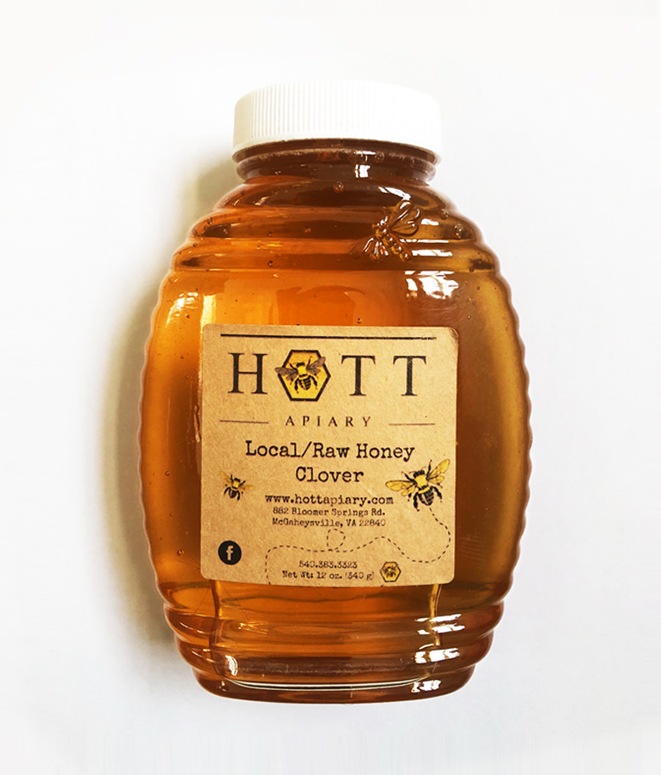BY SARA JOHNSON
Beyond the teaspoon stirred into a mug of tea, the average honey consumer may not give much consideration about how the natural sweetener is made. Michael Hott, the owner of Hott Apiary in McGaheysville, Virginia, has been beekeeping for more than 30 years. Today his apiary includes roughly 600 hives just for honey, and last year it produced more than 40,000 pounds of the sweet syrup. He also offers bees for pollinating crops, as well as sells bees directly. In March 2019, the apiary opened a store in nearby Harrisonburg, VA, selling jars of honey as well as its collection of beeswax and honey products like skin creme and lip balm. Sous-Vide spoke to Hott about his beekeeping business and what to look for when buying honey.
Sous-Vide: What got you started in beekeeping?
Michael Hott: My grandfather had one hive, and we used to play with it a lot. Then he passed away and they were going to get rid of the hives, so I took it over, and one turned into two, and two to four, and so forth.
SV: When did you start selling honey?
MH: I started with the production of honey probably about seven years ago. I still do a lot of pollination services as well, but around here in Virginia, there’s so many areas that can be, like, a specific kind of honey. So we do tulip poplar, clover, wildflower, and thistle.
SV: How do you produce those honey varieties, like wildflower honey?
MH: I have dominant spots that are primarily that specific, and when that bloom starts to come on, I move the hives to that, and then once the bloom starts to go away, I’ll pull all the honey off. It’s 95 percent of what I say it is on the label.
SV: Because they are bees, they can fly.
MH: Yeah, there’s always that bad child in the whole bunch that goes the opposite way.
SV: Do you have any tips for consumers wanting to buy good-quality, sustainable honey?
MH: If you go over to a place that has honey and if you look on the label, the label is either going to say local raw or it’s going to say raw. If it just says raw, it’s not from your area. It’s still raw honey, it’s just not from your area. A lot of people will go by an address, but you can’t, because that’s [just] where they package it. So I try to tell people if you want local raw honey, make sure it says local raw honey. Raw honey is still good, it’s just from some other state.
SV: Why raw honey?
MH: If it’s not raw, what happens is that they have cooked all of the goodness out of it, all the health benefits, so basically it’s just sugar.
SV: Did you happen to catch that episode from the Netflix documentary series Rotten about honey being laced with rice syrup? Do you have any tips for how people can try to avoid that?
MH: Honestly, here’s the thing: Buying local raw honey is a trust issue, so really you have to go out on a limb and trust your local beekeeper, and feel like he or she is actually doing the right thing. … It’s great to go to someplace that has honey, and you call the number and you say, ‘Hey, I bought some of your honey, do you do any tours of your apiary?’ Ninety-nine percent of beekeepers are going to say, ‘Yeah, come on out, man, I’ll take you all around, we’ll get into some beehives, I’ll show you what I do,’ because they want you to feel confident as well.
SV: Do people approach you for that?
MH: All the time. We do a lot of field trips for kids, for pollinators. You know, pollinators are a huge thing right now and even here in the city [Harrisonburg] (I work for the city) we have created a pollinator corridor, so all the schools are interacting with it. I always have ‘John Doe’ calling me up: ‘Hey, I just bought some of your honey, can I come out, just see a little bit about what you got going on? [And I say] ‘Yeah, come on out.’ It spikes their interest, and it makes them more comfortable, because now, once they see an operation, they feel more positive that that honey is actually coming from where you say it’s coming from.
SV: Is there anything else you want to mention?
MH: I hope everybody realizes how important pollinators are. Most people go to the grocery store and pick up vegetables and they don’t really think about where this food comes from—there’s a lot that goes into it. You’ve got farmers and bees and butterflies and everything else. And eat more honey, it’s great for you!
This interview has been edited for clarity and length.


